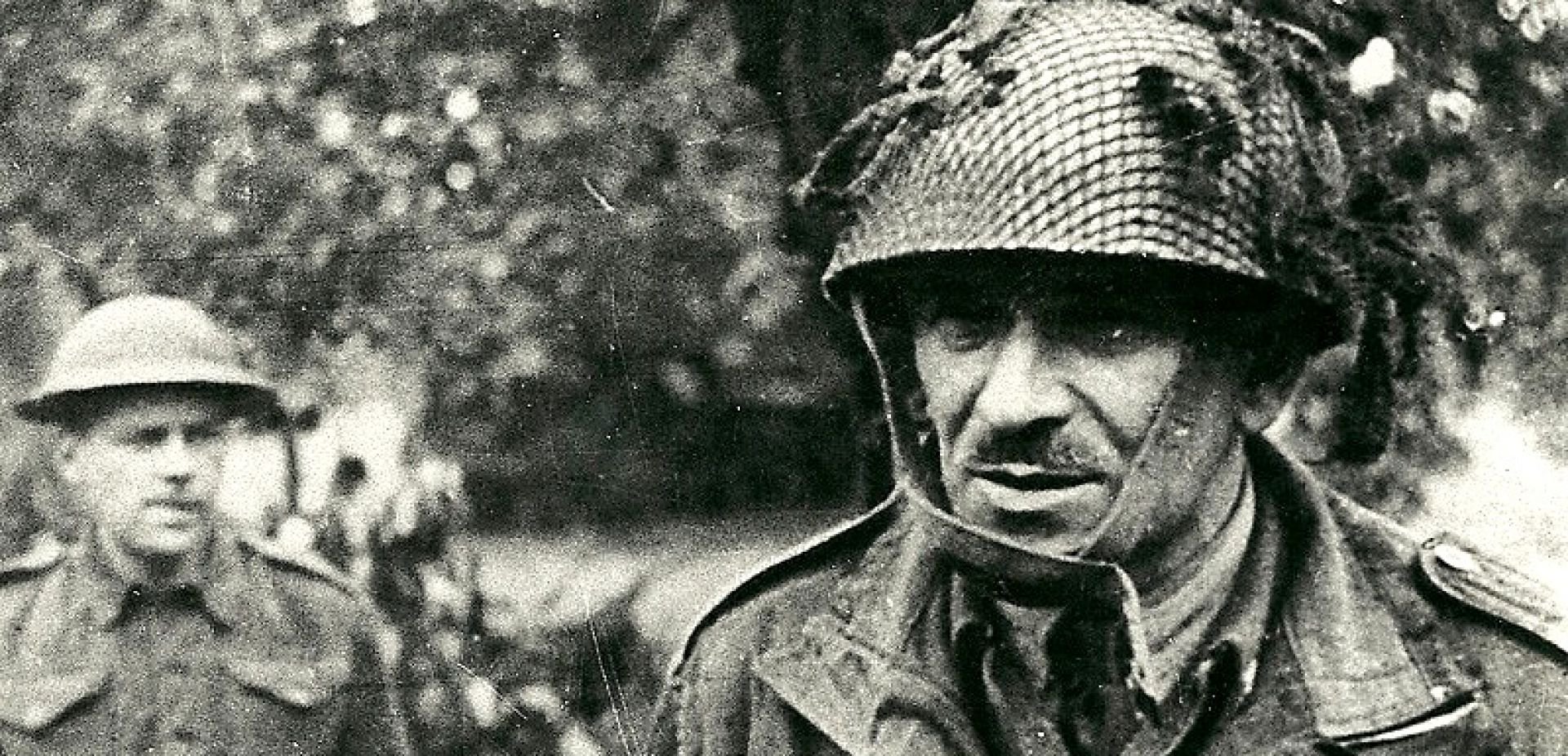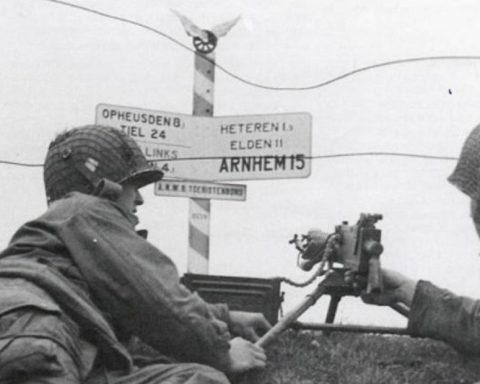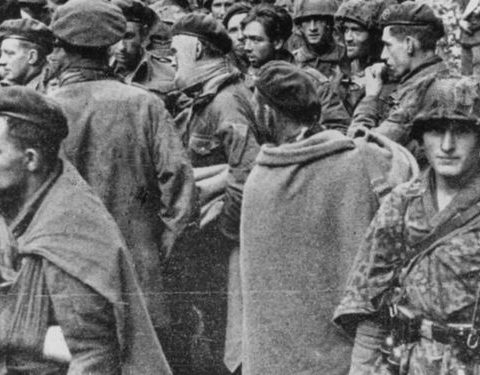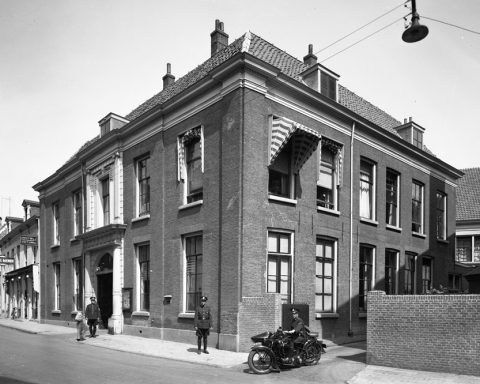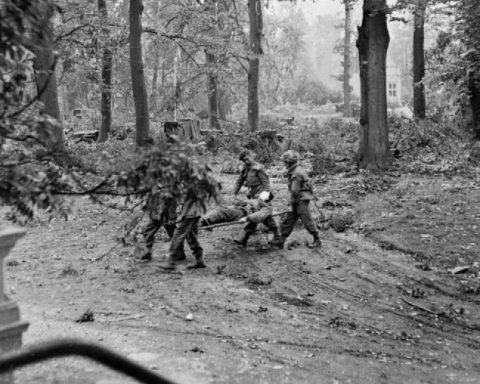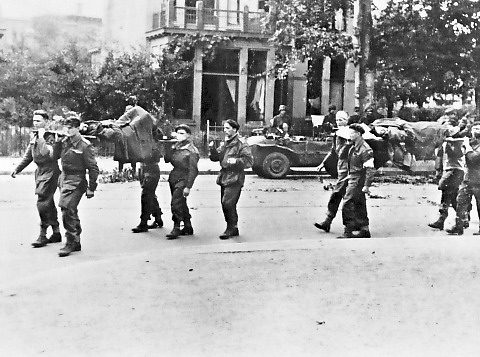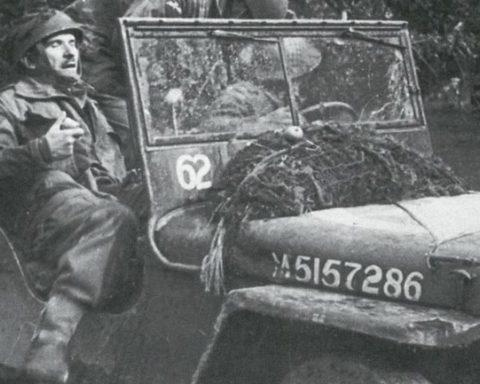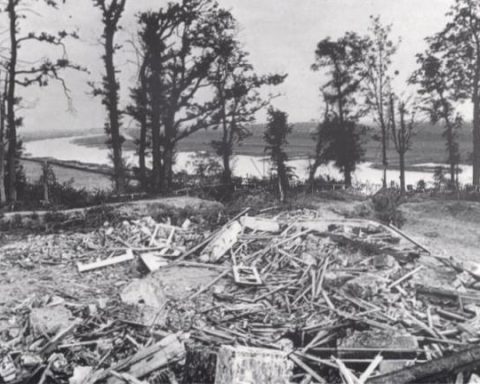On Sunday, December 24, a meeting took place in Valburg between several British generals and the Polish general Stanislav Sosabowski. During the conference, Sosabowski was told that the British wanted to carry out a crossing with two battalions that night near the Westerbouwing.
After the Battle of Arnhem, the Poles in general and General Sosabowski in particular were designated as scapegoats for the failure of Operation Market Garden.
The report below of the Valburg Conference by the Polish lieutenant Jerzy Dyrda shows that the relationship between the British and the Poles was already miserable during the Battle of Arnhem. Lieutenant Dyrda was present as an interpreter at the Valburg Conference. After the war he wrote this report.
—
Sunday, September 24, 1944 was the eighth day since the start of Operation Market Garden. In the morning I lay on the dike on the south bank of the Rhine near Oosterbeek. During the previous night, Polish units had again tried to reach the other side of the river. As an observer I examined what changes there were in our positions. Above all, however, I wanted to know whether the Germans had changed their positions that night.
An orderly reached me and said, “Lieutenant, you must come to the general immediately.” When I asked what was going on, the orderly replied that British generals had been in Driel for a meeting with our commander. I rushed to our headquarters. The headquarters of the Polish Brigade was in a farm. After my arrival, General Sosabowski told me to get a Sten gun and some hand grenades. We would go straight to Valburg for an interview with Lieutenant General Brian Horrocks, the commander of the 30th Army Corps, the British Land Army.
A British jeep drove up. The driver got out and left for his unit in the south. As I looked at the jeep, I remembered the day before. Then Colonel Mackenzie and Colonel Myers of the 1st Airborne Division had gone to the headquarters of the British 30th Army Corps. When they left they were told that it would be too dangerous without an escort. That is why they were given two Dingo scouts and two armored cars. On the way back they lost one armored car in a skirmish with the Germans.
I wasn’t very confident, but the thought that a jeep is faster and more manageable than an armored car gave me confidence. Sosabowski’s regular driver was Sergeant Juhas. He was from the engineers company. Juhas was considered a mad driver. I didn’t like riding with him. But this time I was glad he was the driver. General Sosabowski climbed into the jeep next to Juhas. Our British liaison officer Colonel Stevens and I were given a spot in the back. In this terrain and in the danger we faced: Juhas went wild. He drove at full speed over the narrow roads, often at a speed of more than 70 km/h.
At one point, bullets from a German patrol flew around our ears. We couldn’t let go of the grips to fire back. Letting go would mean being thrown out of the jeep. I was surprised that General Sosabowski had to come to the conference. After all, General Horrocks could have given his orders to Sosabowski in Driel. The Germans were able to attack our brigade again. Then why remove the commander?
I suggested that the night crossing of the river should now finally be planned on a large scale. After all, support for the 1st Airborne Division was desperately needed. But General Sosabowski only grumbled an indistinct answer, and I understood that my assumption was incorrect. I had to focus on the upcoming meeting.
General Sosabowski had sent for me that morning. He had not asked his adjutant Captain Sieczkowski for this conference. A man who had studied at an English university. So he must have known the reasons for the conference. It was clear that the conference would not be easy. Probably the morning discussion with General Horrocks had not taken a good turn.
Reception in Valburg
We didn’t see any boats or pontoons anywhere along the way, although we were always looking forward to them. We quickly reached the headquarters of the British 43rd Division shortly before Valburg. The military police led us to a large tent in a meadow. A dozen British generals and brigadiers stood in front of the tent, as if waiting for us.
Sosabowski reported to General Horrocks. Immediately I noticed that the greeting was very formal. Horrocks asked Sosabowski to enter the tent. The conference would start immediately. Sosabowski asked if he could bring his adjutant into the conference as an interpreter. Immediately Horrocks replied, “Oh no, that’s not necessary. You speak good English. I spoke to you this morning.” Again Sosabowski insisted. Important matters will be decided at the conference and he may not be able to understand everything quickly enough.
Horrocks ignored Sosabowski’s request and quickly walked away toward the tent. During many conferences and personal conversations I was always Sosabowski’s interpreter, and my presence was never considered unnecessary. Suddenly I remembered the cool greeting from Horrocks. I was confused by the indifferent way in which a commander who came straight from the front line on the Rhine was received here. I was all the more surprised because the British 30th Army Corps should have reached the Rhine six days ago and the delay was apparently of little importance. I still did not understand the reason for such a reception.
I wondered why Horrocks didn’t want another Polish officer at the conference. I found no reassuring answer. So I went to Lieutenant General Sir Frederick Browning, whom I knew well because I always translated his discussions with Sosabowski, and I asked: “Sir, you know my general. Don’t you think it would be better if I translated during the conference?” General Browning, who had always treated me kindly, made no answer. He just nodded and went to Horrocks. Horrocks could not refuse a request from Browning.
When we entered the tent, to my surprise, all the British generals and brigadier generals demonstratively had their chairs on one side of the long table. Only General Sosabowski was given a seat on the other side of the table. Even Colonel Stevens, our British liaison officer, sat down on the side of the British officers. Without a doubt, this was a prearranged demonstration against Sosabowski.
Horrocks sat opposite Sosabowski with Browning and Thomas, the commander of the 43rd Wessex Division, next to him. General Sosabowski sat down and told me to sit next to him. When Horrocks saw that he said, “No, the lieutenant can be behind your chair.” I understood this to be Horrocks’ reaction now that he had to comply with Browning’s request.
Crossing the Rhine
The entire conference looked strange and unreal. It did not look like a meeting of officers of allied armies. It was more like a court-martial. With the judges on one side, and the defendant alone opposite them. Lieutenant General Horrocks opened the conference and stated that in accordance with the orders of Lieutenant General Sir Miles Dempsey, commander of the 2nd British Army, a strong British bridgehead has been established on the north side of the Rhine. In line with this, two units will cross the river the same evening. Commander of the 43rd Wessex Division Major General Thomas will command both crossings. Whereupon Lieutenant General Horrocks gave the floor to General Thomas.
General Thomas stood up. The contrast between him and General Sosabowski could not be greater. Like the other British officers, General Thomas looked like a piece of cake. Red collar pattens, neatly starched and ironed uniform and beautifully polished boots. General Sosabowski had parachuted into Driel four days earlier. Although he was cleanly shaven, he looked shabby in his battle dress. Sosabowski had not taken off his battle dress the entire time since he left England. He had only slept a few hours each night. Of course he was tired.
General Thomas stated that there will be two crossings this evening at ten o’clock. The main crossing will be carried out by his 4th Battalion Dorsets at the Driel-Heveadorp ferry landing stage. A few hours later it would become apparent that not an entire British battalion had to be sacrificed, but only half of Dorsets had to cross the Rhine. In fact less than half of Dorsets crossed the river. But we didn’t know that at the time.
General Thomas continued his explanation. The Dorsets take all the ammunition and food for the 1st Airborne Division on the other side of the river. After the Dorsets, the 1st Polish Parachute Battalion follows at the same location. The remaining units of the Polish Brigade will also cross the river at 10 p.m. at the spot where other Polish units had previously crossed the Rhine during the night. Command for both crossings is in the hands of Brigadier General Walton, the commanding officer of the British 130th Infantry Brigade. The boats will be supplied by the 43rd Division. With that General Thomas ended his presentation.
I was dumbfounded by this short and superficial explanation. General Thomas provided no information necessary to organize the crossings. There was no explanation of how many boats would come, of what type, how many soldiers would go in one boat, who would row them: the sappers or the paratroopers themselves. And especially missing when the boats will arrive at the crossings. Nothing about smoke screens. No word if there will be artillery support, direct or indirect.
Do the tanks cover the crossings with their guns, and is there fire support at one or both crossings? And in particular, what will happen later? When will the major offensive begin to relieve the troops across the river? Nothing was said about these important questions. It is possible that Horrocks shared this information with Sosabowski when he was in Driel. But then Sosabowski’s arrival in Valburg would have been unnecessary.
Formality
It was then that I understood this strange conference. It was not an operational discussion but purely a formality. Only intended to provoke Sosabowski and ensure that Sosabowski would refuse. The British knew that Sosabowski did not take the lives of his men lightly. A single refusal by Sosabowski could end the conference immediately. The complete failure of the British 30th Army Corps would then simply be blamed on the Poles.
I no longer had any doubts about the purpose of the conference. What particularly touched me was the rough and unceremonious manner in which our 1st Parachute Battalion was removed under Sosabowski’s command. Thomas had the same rank as Sosabowski and he took a battalion from Sosabowski’s hands without any explanation.
In such cases, English courtesy demands that some argument be given to explain the direct violation of military routine. Especially since Thomas was not higher in rank than Sosabowski. Thomas should at least say: “It is only for the crossing, or the military situation demands it. After the crossing, the battalion will return to your command.” Or words to a similar effect. General Thomas didn’t do that and I wondered why he didn’t. After all, any Englishman would have done that.
The reader should remember that this was not an exaggerated demand for military decency on the part of the Poles. A similar incident had occurred six days earlier between Brigadier Generals Philip Hicks and Sir John Hackett of the 1st Airborne Division, also along the Rhine. In that case, Hackett had strongly objected to removing a battalion and attaching it to another brigade. More and more I was convinced this was a planned action against General Sosabowski.
Fragmented power
There was another serious issue. The gliders of the Polish Brigade landed with our heavy weapons together with the 1st Airborne Division on the north bank of the Rhine, a large part of one Polish battalion had crossed the Rhine in the previous two nights, and now Thomas is taking another battalion under the Sosabowski’s order away. A new situation arose.
Sosabowski was proud of the Polish Brigade he commanded. He had formed and trained the Brigade. And now he was left in command of one battalion. Even if all the units of our Brigade were on the other side of the river, the Polish paratroopers in direct combat with the Germans would remain so scattered among the 1st Airborne Division that Sosabowski would never be able to assemble his Brigade into a single combat unit again.
The striking power of the Poles would remain fragmented until the entire situation had changed thoroughly. I got the impression that the generals of the 30th Army Corps were aiming for exactly that. At that moment I was sure that the generals of the 30th Army expected Sosabowski to strongly object to Thomas’ orders.
They could then argue that Sosabowski’s well-known independent attitude and his critical questions blocked further cooperation and made it impossible to provide efficient assistance to the British paratroopers on the north bank of the Rhine. Especially because the Polish Brigade occupied the south bank of the Rhine. The British generals of the 30th Army Corps bore the burden of what they believed was already a lost operation. They knew that it was largely caused by their caution and their slowness in advancing.
According to Field Marshal Sir Bernard Montgomery’s Operational Directive M 525 of September 14, regardless of what happened on the flanks, the push to the north had to be rapid and fierce and aimed at capturing the bridges. That is why Montgomery promised General Browning that the British 2nd Army would be in Arnhem on the second day of the operation.
Lieutenant General Horrocks also promised a senior officer of the 1st Airborne Division that the 30th Army Corps will be in Arnhem almost at the same time as the 1st Airborne Division. Ignoring the possibility of setback and failure, Horrocks said: “You’ll be landing on the top of our heads.” The attack plan of the 30th Army Corps also stipulated that Arnhem would be reached by the land army on September 19 at 3 p.m. And now it was Sunday, September 24, the eighth day of Market Garden and not the promised second day.
The Orders to Sosabowski
General Thomas simply announced that General Sosabowski, the commander of an elite brigade, was subordinated to Brigadier General Walton, a young infantry general. I realized that this was a blatant violation of military hierarchy. The independence of our brigade was the most sensitive issue for Sosabowski. The British refused to fly our brigade to Poland for deployment during the Warsaw Uprising in August.
Like our soldiers, Sosabowski knew that things were not going well in Warsaw. I understood that he would not accept a second provocation. I chose not to translate this provocative order. General Sosabowski was already so irritated by the blunt removal of his 1st battalion from under his command that he only listened to my translation and no longer to General Thomas’s words.
General Sosabowski only heard about that second provocation much later. I didn’t have a chance to tell him that right after the conference because he was with General Browning all the time. Even after lunch there was no time to inform him about my incomplete translation. I think Sosabowski only learned about this subordination to Walton after the war. He doesn’t mention it in any of his three books.
He described the two previous attempts to subordinate our brigade in detail in all his books. Sosabowski immediately protested in both cases. The reader should remember that of all the Polish units – over 240,000 soldiers – that fought in the west under British command, our brigade was the only unit with the sole purpose of fighting on Polish territory.
A Major Attack
I was surprised by what happened. This was the first time in my long experience that I had seen such behavior on the part of British officers. Before that I had only encountered courtesy, friendliness and always a correct attitude among the English. After Thomas’s speech there was a short silence. No one wanted to ask a question or say anything. Then General Sosabowski stood up to speak. I translated. Sosabowski began by describing the situation on the north bank of the Rhine.
The British paratroopers had been fighting alone for eight days. They had suffered heavy losses, more than two-thirds of their fighting strength, and they were no longer a division. With the exception of a 300-meter strip of no man’s land on the south side near the river, the paratroopers were surrounded. They were constantly attacked and shelled with artillery.
They were exhausted and lacking everything, especially ammunition, food, clothing and even drinking water. That is why immediate help is desperately needed. Westerbouwing, the tens of meters high embankment opposite the ferry stop at Driel, is occupied by strong German units and from this position the Germans dominate a large part of the river. Therefore, a crossing should not be attempted at that location. Moreover, a crossing of just one British battalion and the remaining units of the Polish Brigade would not sufficiently change the general situation on the northern riverbank for the better. Once again Sosabowski emphasized that a crossing at the ferry crossing has no chance of success. Exactly there are the strongest positions of the Germans.
General Urquhart knows the tactical importance of Westerbouwing and without a doubt he is trying to take it there. If his paratroopers do not succeed, one battalion that also comes from the other river bank will certainly have no chance of success. But in recent days – Sosabowski continued – he had carefully observed the German positions on the north bank and had come to the conclusion that the Germans currently had no reserves left, no reinforcements were arriving in Arnhem, and even a shortage of ammunition was.
Polish patrols and information from the Dutch confirm that there are no strong German units a few miles west of Westerbouwing. Only a river crossing at three or four places at a time and further west than the ferry location can be successful. Also, only a powerful attack by an entire Division together with the remaining units of the Polish Brigade will change the situation on the north bank of the Rhine.
At the end of his argument, Sosabowski again emphasized that simultaneous crossings in four places further west will yield a successful crossing in at least two or three places. However, if you cannot or do not want to realize such a river crossing on a large scale – he adds – then the only option is the withdrawal of the paratroopers from the north bank.
Of course, General Sosabowski was absolutely not considering a withdrawal from the northern bank of the Rhine. That would mean the failure of the entire Operation Market Garden. However, he wanted the generals of the British 30th Army Corps to realize that there is no alternative beyond his proposal. Speaking about his 1st Paratrooper Battalion, Sosabowski merely reported that as brigade commander he can best determine which of his battalions should cross the river with Dorsets.
At that moment, the fate of one of his battalions became secondary to his goal of not losing another important battle with the Germans. Once again Sosabowski showed that he could weigh major military interests and that only one matter was important to him: that Arnhem was captured from the Germans.
General Thomas’ Orders
Without any hesitation, General Thomas stood up. Completely ignoring Sosabowski’s arguments and proposal, General Thomas declared that the crossing should begin at 10:00 PM as ordered by him. The boats will be available, and the orders must be fulfilled. I translated this haughty statement. At that moment, Sosabowski could no longer remain calm. He stood up and spoke in English himself. His English improved in step with his anger.
In almost all airborne operations that the British planned prior to Market Garden, Sosabowski had warned the British officers not to underestimate the Germans. Knowing that his analysis was correct and that his plan to cross the Rhine in several places at the same time was feasible, it was he who tried to convince the younger British generals that Market Garden could still be won.
The thought of being defeated by the Germans again, especially at this stage of the war, with a preponderance of artillery, tanks and aircraft on the Allied side, was unbearable for him as a professional officer. Among all the generals present, he was by far the most experienced commander. Even before the war he had been a professor at the Military Academy in Warsaw, and even before the war he commanded Polish regiments, while General Horrocks, commander of the 30th Army Corps, commanded a group near Dunkirk in May 1940. battalion. The complete disregard of his knowledge- and experience-based analysis deeply hurt Sosabowski.
Sosabowski’s proposal is ignored
General Sosabowski wanted at all costs to convince the generals of the 30th Army Corps that Arnhem could be conquered. He never gave up his plans easily. Since Horrocks and Thomas stubbornly stuck to their pre-arranged plan and flatly refused to even consider Sosabowski’s proposal, he decided to shock them.
Sosabowski stood up again and said: “The crossing at the ferry site cannot meet with success. You won’t gain anything by this way. You will only sacrifice your soldiers. Moreover, only one battalion will not change the situation”. Thomas tried to interrupt him. Sosabowski lost his cool and added angrily: “But remember that since eight days and nights not only Polish soldiers but also the best sons of England are dying there in vain, for no effect.”
At that moment Horrocks came to the aid of General Thomas. Interrupting both Sosabowski and Thomas, he shouted, “The conference is over. The orders given by General Thomas will be carried out’. And turning to Sosabowski, he added: “And if you, General, do not want to carry out the orders given to you, we shall find another commander for the Polish Para Brigade, who will carry out our orders.”
At that moment I regretted that Sosabowski had not allowed me to translate. But I understood him. He knew that my more diplomatic way of translating would have had no effect, and here the lives of soldiers were at stake. This was extremely important to Sosabowski. He had a great sense of responsibility for the lives of soldiers. I realized that this conference will have consequences for our Polish brigade, and especially for General Sosabowski.
As Sosabowski walked out of the tent, he saw General Thomas giving instructions for our brigade to Colonel Stevens, our British liaison officer. Sosabowski went up to them, but Thomas completely ignored him. After General Thomas gave his orders to Stevens, he walked away without shaking Sosabowski’s hand or even a brief nod.
Lunch with General Browning
General Browning, who had not said a word during the entire conference, came to Sosabowski and invited him to lunch in Nijmegen. After the incident with General Thomas, Sosabowski was pleasantly surprised by Browning’s invitation, especially since he still had hope of convincing General Browning of his plan for a large-scale river crossing.
In Nijmegen Browning went with Sosabowski to their mess after they had dropped me off at the mess for the junior officers. General Sosabowski told me that he will pick me up after lunch to go back to Driel. After more than an hour, Sosabowski returned in a new staff car. I noticed that he was quite tense and a little later he told me that a major crossing of the Rhine is impossible because there are not enough boats available.
With grim pleasure he told me that he had told Browning what he thought of this negligence. He had told General Browning that a Polish officer, if he had to cross only one river with his unit, let alone six major water obstacles, would certainly not forget to take boats with his unit. And what did Lieutenant General Horrocks, and all his generals and their entire staff do? Here in Nijmegen there were hundreds of trucks, even red cross trucks had arrived, but no trucks with boats. Did all the generals forget the boats?
Back to the Rhine
For Sosabowski this knowledge was extremely bitter, as he now understood that the great losses suffered by our brigade during our crossing were due to the lack of boats, boats that the British land army would supply to us. Sosabowski could not understand the carelessness of Horrocks and his generals. Their thoughtlessness gave the Germans the opportunity to concentrate their fire on the small number of boats we had received from the 43rd Wessex Division.
The whole turn of events deeply disturbed me. General Horrocks was a close friend of General Browning. Moreover, I realized that the generals of the 30th Army Corps will not forget that at the Valburg conference Sosabowski exposed their reluctance to make a greater effort to come to the aid of the 1st Airborne Division.
I knew that General Sosabowski had lost his last friend among the British generals, no one would stand up for him anymore. I knew the British mentality and I felt it necessary to warn General Sosabowski of the consequences that were sure to come. Maybe I did it in too direct terms. The past few days had taken a toll on all of us.
General Sosabowski, who knew he was right and had acted correctly, who knew he had made no mistakes, reacted as if I had gone out of line. He was very indignant at my frank warning. Since that day he hasn’t called me to him anymore.

